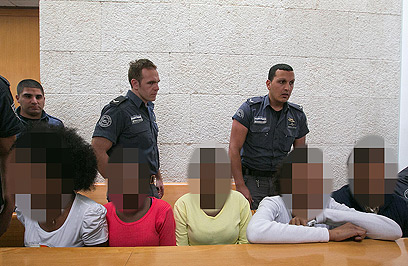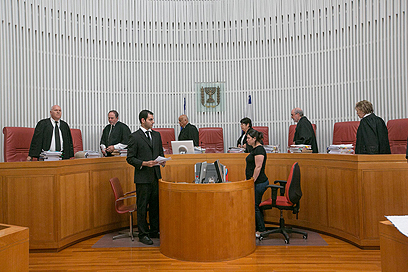
Eritreans doubt they'll be transferred to third country
State's announcement of agreement to transfer asylum seekers to another country received with skepticism by Eritreans. Rights groups: Israel telling tales
Mixed feelings were expressed among illegaln Eritrean immigrants living in Tel Aviv, after hearing the State's statement claiming an agreement was reached with a foreign country to transfer migrants to its territory.
The statement was made at a court hearing discussing a petition to rescind the Infiltration Prevention Law, which allows the State to hold illegal migrants for three years without trial.
Some Eritreans residing in Tel Aviv estimated this move would not be carried out, while others expressed hope for a quick solution that would allow them to leave Israel.
Related Stories:
- Israel reaches deal to deport immigrants
- Sa'ar on refugees: We'll send them away
- High Court: State must explain infiltration law
Davit, a 26-year-old Eritrean who has been living in Tel Aviv for three years, said "We escaped a dictatorial regime, and it is ridiculous to say we should be transferred from one country to another. Our situation here is bad, there are over 2,000 Eritreans in a refugee camp. I don't believe this step will be taken."
Emmanuel Yemeni, 34, also a resident of Tel Aviv, said: "We don't even know what foreign country they are talking about. After five years in Israel it upsets me that I'm still not considered a refugee. It's hard to believe that a third country would accept 35,000 Eritreans.
"I'm not waiting to get land or citizenship here. I can't wait to get back to my family and kids, but until things are better in Eritrea I can't go back there. Once it does, I won't stay here another minute."

'No standards of living' (Photo: Ohad Zwigenberg)
Medin Tesfahiwet, residing in Israel for three years, gave a different perspective. "The intention to transfer us to a third country is very serious. The way we live here is not what I had expected. I did not receive refugee status and therefore there are no proper standards of living here. It is even dangerous to live here. I'm not allowed to work, I have no rights, and those are the two most important things to me – security and rights."
'Tales of third country'
Human rights organizations criticized the State's statement. Attorney Reut Michaeli, executive director of the Tel Aviv-based Hotline for Migrant Workers, said that "just like before, the State keeps telling the Court tales of a third unknown country that is about to absorb all refugees in Israel. The State once again tries to hide the fact that it cannot justify its policies."
Attorney Yonatan Berman, director of the Clinic for Migrants' Rights at the College of Law and Business, who represents human rights groups and asylum seekers, said: "Since 2005, we've been hearing from the State Prosecutor of an 'unnamed country' that has agreed to absorb refugees from Israel. Meanwhile, men, women and children are imprisoned for over a year, only so that the State could claim it is doing something."

'Unnamed' third country agrees to accept refugees (Photo: Ohad Zwigenberg)
During the High Court hearing on Sunday, the State attorney Yochi Gensin said that an agreement was reached with another country to accept the Eritreans. She did not give details as to when the arrangement would be implemented or how many would be deported. In regards to North Sudanese residents, she mentioned that 2,100 immigrants have already been transferred to a third country.
Gensin noted that the Eritreans who infiltrated Israel are seeking asylum on the basis of desertion from the army or illegally leaving Eritrea. She added that if plans to transfer the migrants to other countries would not be carried out as planned, the possibility of turning detention facilities into open facilities will be examined.
According to the State, the law is necessary to stem the illegal immigration phenomenon, as the fence constructed on the Egyptian border alone is not enough to block their entry.
"We know of intentions by those who organize the refugees' arrival, to direct them to the area through places in which no fence has been constructed yet: The Jordanian border and the Red Sea, near Jordan and Eilat," Gensin said.
Omri Efraim contributed to this report
- Receive Ynetnews updates directly to your desktop










